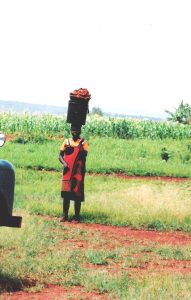Stories of Care 5 – Njiku the Farmer
by Sr. Marian Scena USA/Tanzania 24.10.2023
 In early February 2016 our palliative care volunteer, Sammy, arrived with a man who he thought needed care. Sammy had gone to his shamba(farm) in a rural part of another District about 40km from town. There he met Njiku (not his real name) who was complaining of severe pain in his left chest and shoulder, and he was unable to sleep due to the pain. He also had a mass and large wound on his left chest.
In early February 2016 our palliative care volunteer, Sammy, arrived with a man who he thought needed care. Sammy had gone to his shamba(farm) in a rural part of another District about 40km from town. There he met Njiku (not his real name) who was complaining of severe pain in his left chest and shoulder, and he was unable to sleep due to the pain. He also had a mass and large wound on his left chest.
When we asked him about his health, he told us that he had had an amputation of the end of his index finger in 2011. No pathology tests were carried out. He was well until February 2015 when he noticed a large lump in his left armpit. He went to another hospital and the swelling was biopsied and showed metastatic malignant melanoma, a type of skin cancer which had resulted from the problem in his little finger in 2011. There was no possibility of him going to the cancer hospital in Dar es Salaam. So, we needed to treat his severe pain and the large ulcer or sore he had on his chest. We got oral morphine and gave it to him, and he experienced great relief after 15 minutes. Njiku was married with five children, and he had a small farm, but wasn’t able to work on it due to his pain.
Usually, our patients come from our own municipal area, but, on occasion, if a patient or a relative can come for the medications we agree to accept them into our Palliative Care Programme, especially if they have severe pain and need morphine. We started to treat Njiku’s pain following the “WHO 3-step Ladder” for pain control, but he needed morphine to get relief of his pain. Luckily, his relief of pain was so complete that he was even able to go to his shamba to work for a short time each day!
Njiku was able to come to MMM Faraja Centre to collect his morphine and our volunteer visited him at his home in the village and even accompanied him on the bus to town when he needed more medications. We continued to treat Njiku from a distance and phoned his neighbour (as he himself didn’t have a phone) to assess his condition. On 21 May 2016 we received word that Njiku had died during the night. We were very happy that, although it wasn’t easy to treat him at a distance, we had greatly improved his quality of life and he felt cared for by our Palliative Care team.
SEE ALL BLOG POSTS
